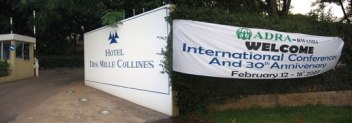Faith-based organizations (FBOs) are playing a key role in the fight against HIV/AIDS in Africa, a new United Nations (UN) report has said.
According to an important study released February 8 by the World Health Organization (WHO) at the National Cathedral in Washington DC, efforts are needed to encourage greater collaboration between public health agencies and faith-based organizations (FBOs), if progress is to be made towards the goal of universal access towards HIV prevention, treatment, care and support by 2010.
The study focused on Lesotho and Zambia, which had HIV prevalence rates of 23.2 and 17 per cent respectively in 2005.
It found that Christian hospitals and health centres provide about 40 per cent of HIV care and treatment services in Lesotho and almost a third in Zambia.
"Faith-based organizations are a vital part of civil society," said Dr Kevin De Cock, Director of WHO's Department of HIV/AIDS. "Since they provide a substantial portion of care in developing countries, often reaching vulnerable populations living under adverse conditions, FBOs must be recognized as essential contributors towards universal access efforts."
That WHO, the U.N. public health arm that commissioned the study, now recognizes the contributions of FBOs is significant, told Dr. Allan Handysides, health ministries director for the Seventh-day Adventist world church, to the Adventist News Network (ANN). Handysides echoed the findings of the report which noted that in the past many public organizations have overlooked the vital health services that religious groups have provided.
The report called on the FBOs to expand their network and to work in close partnership with governments and NGOs, saying between 30 and 70 per cent of the health infrastructure in Africa was under them.
“WHO has done a great service in quantifying the role of the faith community in providing HIV/AIDS care and treatment in sub-Saharan Africa,” Rev Canon John L. Peterson, Director of the Center for Global Justice and Reconciliation at Washington Cathedral said.
The findings of the report were discussed at the National Cathedral in Washington D.C. during a meeting that drew more than 100 representatives from church organizations, the United States Congress, public policy groups, the World Health Organization (WHO) and other nongovernmental organizations (NGOs).
During the day the medical and spiritual contributions of various faith organizations were highlighted as examples of groups that could do more if they had more funding and recognition from governments. The Seventh-day Adventist Church in Africa was mentioned several times, particularly for adopting a model developed by the church's Adventist AIDS International Ministry (AAIM) office, based in Johannesburg, South Africa. That model envisions each Adventist church as a "support centre for the community through church-based HIV/AIDS support groups." Facilitating that level of community involvement, AAIM provides not only medical care and education, but also intangible spiritual encouragement.
Dr. Peter Landless, associate health ministries director for the Adventist world church, said that it was time for collaboration between not just the church and the public sector but also between varying faith groups.
The report stated there were more 750,000 Christian organizations on the continent of Africa which outnumber hospitals and schools combined. And that number does not include organizations led by non-Christian faith groups. Several presenters explained that in this area of the world hardest hit by HIV and AIDS, governments cannot continue to ignore the contributions of religious groups.
Also the report acknowledged that religion and culture determine how people respond to AIDS. “Pastors, imams, and volunteers who minister to those who are suffering from deadly diseases are fully aware of their constituents’ needs, and have responded with care on the front lines,” concluded the report.
The pilot study was undertaken by partners in the African Religious Health Assets Programme (ARHAP) at the Universities of Cape Town, KwaZulu-Natal, and Witwatersrand in South Africa, and researchers from the Rollins School of Public Health at Emory University in Atlanta, USA. Researchers are confident that their efforts have yielded the first credible data capturing the extent to which FBOs are providing HIV/AIDS care in Lesotho and Zambia.
The African Religious Health Assets Program (ARHAP) study is available in the Internet at:
http://www.arhap.uct.ac.za/research_who.php#arhapwho_chapters

